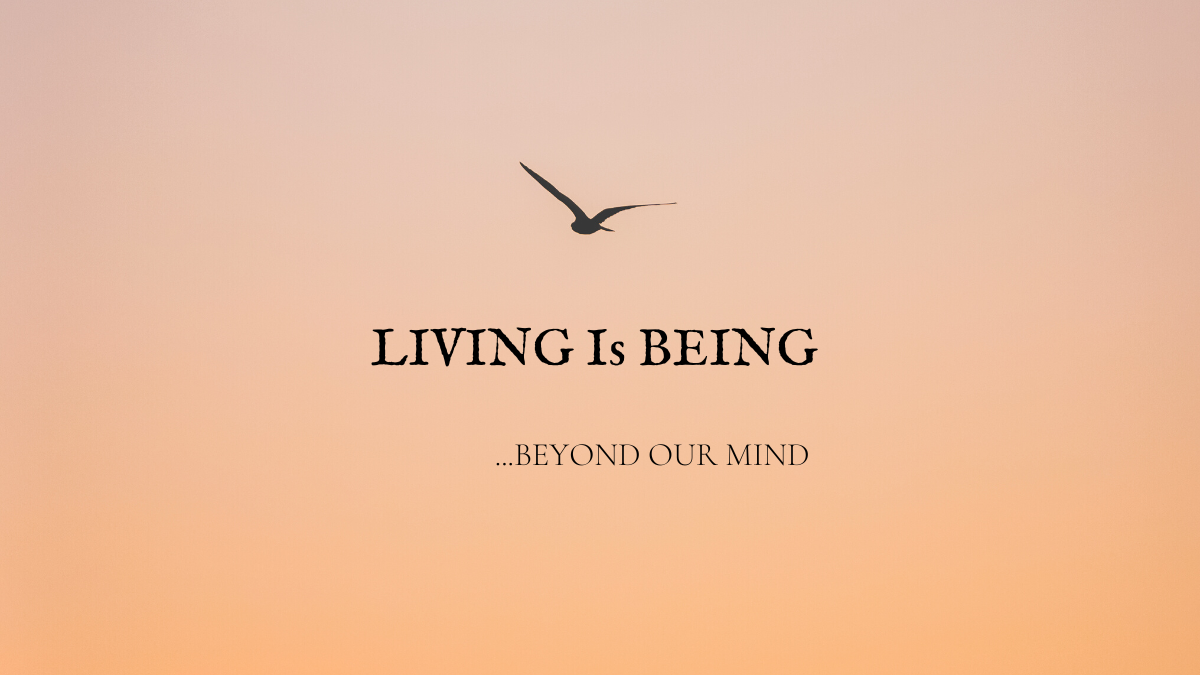A few weeks ago, I woke up on Saturday morning and I had a great insight that I had to write down right away.
The idea I couldn’t stop thinking about is very simple and almost taken for granted, but in today’s world, we all interpret it differently.
“Living is being”
Wait, what exactly does that mean?
I’ve been asking people around me for possible interpretations based on their own experiences of what „to be truly living“ means to them..
Here are some of their answers.
“To live is to find the constant state of happiness,“someone told me.
“To live is to have the opportunity to live in a beautiful place,” someone continued.
“To live means to be loved.”
The answers kept coming:
“To live is to be doing what I love.”
“To live is to have a freedom of choice.”
“To live means to meet the needs of my senses every day.”
“To live is to be successful and achieve results after years of sacrifice and hard work.”
“In order to live, you have to make a lot of money.”
“To live means to be with people who make me happy.”
“To live means to have the possibility to choose all the things I want.”
“To live means to be in the place where my heart feels good.”
“To live means to earn a passive income.”
“To live means to travel and discover new places.”
“To live is to have a loving family.”
From their answers, I learned that some people consider “living” to be an emotional state, others a circumstance, some of them an action and others a possession of something.
Who do you believe is correct? Is there a single valid answer? No, because any of them could be correct. I believe, everyone has their own version of the truth.
It’s amazing to see how different each of our interpretations about life and the world around us are.
What if I simply replace the verb in each sentence with “to be”?
“To live means to be loved.”
“To live means to be able to do what I love.”
“To live means to be successful after years of hard work.”
“To live means to be rich.”
“To live means to be surrounded by people who bring joy to my life.”
“To live means to be a traveler.”
However, what happens is that once I complete the given sentence, its opposite will mean that I’m actually not fully living.
For me, for many years, it was to find that constant state of happiness. And if I didn’t, it meant I wasn’t fully living my life. Moreover, I also believed that this state of continual joy, could only be achieved by making changes in the outside world.
“To truly live means to be constantly happy.”

Another interpretation I was giving for a long time to this sentence was that to live meant to produce results. I don’t really live if I’m not achieving a great results in all the aspects of my life, including education, career, relationships, and finances.
“To live means to be achieving great results.” However, this affirmation automatically implied that if I wasn’t excelling in certain aspects of my life, I wasn’t truly living.
Wait, if I think about my life for even a second, are these statements true?
Something unusual occurred about a year and a half ago. Despite having accomplished everything I wished and made the needed changes in the outer world to obtain that highly desired constant state of happiness, I never achieved it.
Indeed, even though I was living in the beautiful place, had enough money saved, with no financial difficulties, with my loving boyfriend by my side and surrounded by wonderful people, I fell into sadness and depression. It was a period in my life when I was waking up in the morning, unhappy and dissatisfied with everything. Instead of feeling happy I often felt sad, empty and hopeless because out there I had it all, but inside I felt broken.
For me it was like double defeat because my belief “to live means to be always happy and this emotional state can be achieved if you change things out there” was falling apart.
During that time, everyone told me, “Niki, you should be grateful for what you have because not everyone has the same opportunities as you.” At that moment, the sense of guilt I felt inside got even stronger.
However, I will be eternally grateful for my period of sadness and depression because this is where my journey to self-discovery starts and this is where I begin to question my
never-ending pursuit of happiness. Since I felt all the other feelings but not joy, I began to wonder what would happen if I gave up my search and simply began to embrace all the emotions that arise.
And so, after a year and a half of gradually becoming more aware of all the feelings that came up along the way without trying to repress them, I decided to open this blog called “living is being” whose name capture the main insight with which I wake up every morning as a result of everything I’ve experienced.
Thanks to this affirmation I have a choice as to whether I want to live my life in the here and now or whether I’ll let my mind constantly search for the possible completion of the sentence “living means being…”
And what if the abundance that I experience in the areas of my life is truly just reflection of the new realizations that I have discovered about myself? What if all these external circumstances happen just as I firstly begin to appreciate the meaning of the core expression “to live simply is to be,” and then everything else blossoms on its own without any further intervention?
However, at this very moment, I am conscious of the fact that the primary source of the belief that I am truly living is not coming from accomplishing something external, but rather from returning to myself, which is where the meaning of the this sentence has been available for me ever since the day that I was born. In other words, I realize that the feeling that I’m living isn’t coming from any action I’m taking in the outside world. Instead, it’s a state of being that comes from inside me.
At this point, I’m wondering if is it necessary for me to always search to have something more or to become someone better than what I am now?
What if my life purpose is not to grow into someone or something more but rather it’s about unbecoming everything I have always believed myself to be?
Any opinion or affirmation I choose to publish should be viewed as one of my subjective perspectives on life. It is not in my best interest to sell my truth to others as objective and universal because I believe that personal experiences will bring each of us to those stages from which we will develop our own theories and worldviews and with which we will resonate the most. Nor do I try to push my worldview on others so that they must see the world the same way I do. Where does it actually indicate that what I say, or what anyone else says, is the universal truth?
Rather, I like to think that I could serve as a source of motivation for some people, encouraging them to discover their own theories that will help them construct their own world, and to share these things without any hesitance.
If there is someone who see things the way I do, I will be pleased that there are more of us and if there are those who perceive it differently, I’ll be happy to broaden my perspectives.
